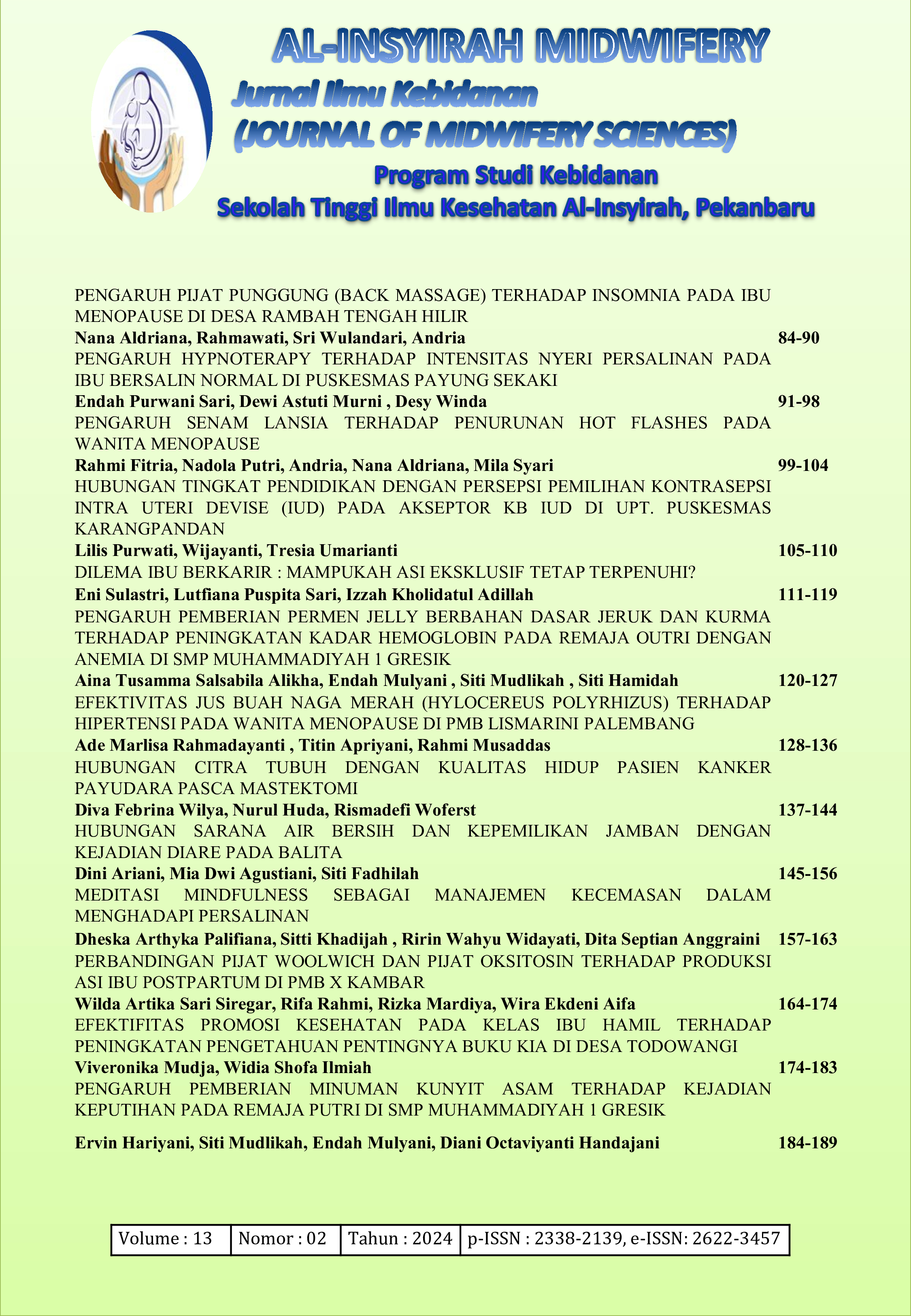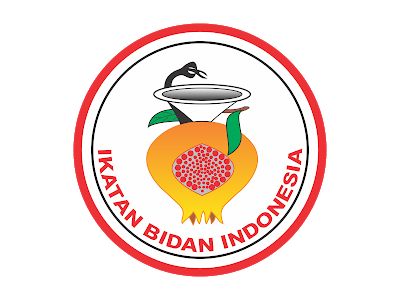DILEMA IBU BERKARIR: MAMPUKAH ASI EKSKLUSIF TETAP TERPENUHI?
DOI:
https://doi.org/10.35328/kebidanan.v13i2.2772Keywords:
Ibu bekerja, ASI Eksklusif, KebijakanAbstract
In 2022, Indonesia saw a reduction in exclusive breastfeeding rates, decreasing from 69.7% to 67.96%. This decrease negatively impacts the health of mothers and infants alike. A major barrier to breastfeeding is employment, as working mothers often face difficulties due to maternity leave being shorter than the recommended duration for breastfeeding, which can lead to the use of formula. It aims to examine the connection between employment status and the effectiveness of exclusive breastfeeding in the Puskesmas Wedi, Klaten area. Utilizing a cross-sectional design, the research focuses on mothers with infants aged 6 to 12 months, with a total of 77 respondents chosen through cluster random sampling techniques. The collected data were analyzed using the chi-square test. The results indicated that 14 respondents (18.2%) were working mothers, while 63 respondents (81.8%) were not. Among these mothers, 62 respondents (80.5%) successfully provided exclusive breastfeeding, while 15 respondents (19.5%) did not succeed. The statistical analysis revealed a p-value of 0.024 (p < 0.05), indicating a significant relationship between employment status and the success of exclusive breastfeeding.
Downloads
References
Agustina, N. R. (2022). Peran Kelompok Dukungan Bagi Keberhasilan Ibu Bekerja Memberikan ASI Eksklusif. In Amerta Nutrition. https://doi.org/10.20473/amnt.v6i1sp.2022.99-106
Anggraeni, M. D., Punthmatharith, B., & Petpichetchian, W. (2020). A Causal Model of Breastfeeding Duration Among Working Muslim Mothers in Semarang City, Central Java Province, Indonesia. In Walailak Journal of Science and Technology (Wjst). https://doi.org/10.48048/wjst.2020.5406
Astuti, A. D., Rochmaedah, S., Tunny, R., Laitupa, R., Husada, S. M., Cengkeh, J. K., Merah, B., Sirimau, K., & Ambon, K. (2022). Karakteristik Ibu Menyusui Dalam Pemberian Asi Eksklusif di Wilayah Kerja Puskesmas Waplau Kabupaten Buru. Jurnal Riset Rumpun Ilmu Kesehatan (JURRIKES), 1(1).
Audia, M. S., Lestari, W., & Sari, N. Y. (2023). Faktor - Faktor Yang Mempengaruhi Ibu Dalam Memberikan ASI Eksklusif: Literatur Review. DIAGNOSA: Jurnal Ilmu Kesehatan Dan Keperawatan, 1(3), 01–16. https://doi.org/10.59581/diagnosa-widyakarya.v1i3.834
Azizah, N., Nisak, A. Z., & Rahmawati, A. M. (2023). Pendidikan Dan Pengetahuan Ibu Bekerja Tentang Asi Perah. In Jurnal Ilmu Keperawatan Dan Kebidanan. https://doi.org/10.26751/jikk.v14i1.1690
Chen, J., Tong, X., Gaoshan, J., Li, Q., Zou, K., Tan, S., Cheng, Y., Liu, Y., Chen, J., Wang, H., Mu, Y., Jiang, L., & Tang, K. (2019). The Association Between Work Related Factors and Breastfeeding Practices Among Chinese Working Mothers: A Mixed-Method Approach. In International Breastfeeding Journal. https://doi.org/10.1186/s13006-019-0223-z
Dinkes Jawa Tengah. (2022). Profil Kesehatan Jawa Tengah Tahun 2022.
Dinkes Klaten. (2022). Profil Kesehatan Kabupaten Klaten 2022.
Gemilang, S. W. (2020). Hubungan Usia, Pendidikan, dan Pekerjaan dengan Pemberian ASI Eksklusif. Universitas Muhammadiya Surakarta.
Hizriyani, R. (2021). PEMBERIAN ASI EKSLUSIF SEBAGAI PENCEGAHAN STUNTING. Jurnal Jendela Bunda Program Studi PG-PAUD Universitas Muhammadiyah Cirebon, 8(2), 55–62. https://doi.org/10.32534/jjb.v8i2.1722
Irdawati, I., Kusumawati, Y., Lestari, W., Fadhila, V. N., & Nafisah, H. (2024). Analysis of Factors That Cause Infants Aged 0-6 Months to Not Receive Exclusive Breastfeeding From Their Mother. In International Journal of Public Health Science (Ijphs). https://doi.org/10.11591/ijphs.v13i2.23395
Irianti, D., Pusparina, I., & Ikasari, F. S. (2023). Efikasi Diri Menyusui Ibu Bekerja Berperan Penting Dalam Pemberian ASI Eksklusif. In Jurnal Skala Kesehatan. https://doi.org/10.31964/jsk.v14i1.377
Kemenkes RI. (2022a). Buku Saku Hasil Survei Status Gizi Indonesia (SSGI) 2022.
Kemenkes RI. (2022b). Profil Kesehatan Indonesia Tahun 2022.
Kurniasih, A. (2020). Partisipasi Ibu Dalam Bidang Ekonomi Terhadap Keberhasilan Pemberian ASI Eksklusif Di Indonesia. In Jurnal Syntax Transformation. https://doi.org/10.46799/jst.v1i6.57
Kurniawati, D., Hardiani, R. S., & Rahmawati, I. (2020). Air Susu Ibu. CV KHD Production.
Mandasari, P., & Budianto, Y. (2021). Faktor-Faktor Yang Berhubungan Dengan Pemberian ASI Eksklusif Oleh Ibu Menyusui Yang Bekerja Sebagai Tenaga Kesehatan Di Rumah Sakit Umum Daerah Kota Prabumulih. In Media Publikasi Promosi Kesehatan Indonesia (Mppki). https://doi.org/10.56338/mppki.v4i1.1339
Natsir, N. F., & Nirwana, N. (2024). Hubungan Status Pekerjaan dengan Pemberian ASI Eksklusif pada Ibu yang Memiliki Bayi Usia 7-12 Bulan Di Wilayah Puskesmas Mamajang Makassar. Jurnal Ners, 8(2), 1701–1706. https://doi.org/10.31004/jn.v8i2.23232
Olya, F., Ningsih, F., & Ovany, R. (2023). Hubungan Status Pekerjaan Ibu dengan Pemberian ASI Eksklusif di Wilayah Kerja UPT Puskesmas Menteng Tahun 2022: The Correlations the Mother’s Employment Status with the Giving Gexclusive Breastfeeding in the Working Area Of UPT Puskesmas Menteng in 2022. Jurnal Surya Medika (JSM), 9(1), 137–145. https://doi.org/10.33084/jsm.v9i1.5160
Osibogun, O. O., Olufunlayo, T. F., & Oyibo, S. O. (2018). Knowledge, Attitude and Support for Exclusive Breastfeeding Among Bankers in Mainland Local Government in Lagos State, Nigeria. In International Breastfeeding Journal. https://doi.org/10.1186/s13006-018-0182-9
Polwandari, F., & Wulandari, S. (2021). The Depiction of Age, Parity, Education Level, Employment Status, Husband Support, and Maternal Knowledge Level in Exclusive Breastfeeding. Faletehan Health Journal, 8(01). https://doi.org/10.33746/fhj.v8i01.236
Ramli, R. (2020). Correlation of Mothers’ Knowledge and Employment Status with Exclusive Breastfeeding in Sidotopo. Jurnal PROMKES, 8(1), 36. https://doi.org/10.20473/jpk.v8.i1.2020.36-46
Rani, H., Yunus, Moch., Katmawanti, S., & Wardani, H. E. (2022). Systematic Literature Review Determinan Pemberian ASI Eksklusif di Indonesia. Sport Science and Health, 4(4), 376–394. https://doi.org/10.17977/um062v4i42022p376-394
Rodianto, E. A. (2022). Dukungan Tempat Kerja Terhadap Keberhasilan Pemberian ASI Eksklusif Pada Ibu Pekerja Di Kabupaten Bandung Barat. In Media Publikasi Promosi Kesehatan Indonesia (Mppki). https://doi.org/10.56338/mppki.v5i12.2889
Salsabila, R., & Ismarwati, I. (2023). Hubungan Status Pekerjaan Ibu Dengan Pemberian ASI Eksklusif Di Wilayah Kerja Puskesmas Gamping II. Indonesian Journal of Professional Nursing, 4(2), 102. https://doi.org/10.30587/ijpn.v4i2.5961
Santi, M. Y., Santoso, S., & Sholihah, N. (2020). Relationship Support of Work Places With Exclusive Breastfeeding on Working Mothers. In Kesmas Indonesia. https://doi.org/10.20884/1.ki.2020.12.1.1447
Ulya, R. A. N. A. (2023). Dukungan Sosial Untuk Mendukung Keberhasilan Pemberian ASI Eksklusif Pada Ibu Bekerja Sebagai Upaya Pencegahan Stunting Di Indonesia. In Media Gizi Kesmas. https://doi.org/10.20473/mgk.v12i1.2023.541-552
UNICEF. (2019). Kerangka Aksi Makanan Pendamping ASI.
Wahyudi, E. K., Anjarwati, A., & Pratiwi, C. S. (2021). Pengalaman Ibu Bekerja Dalam Pemberian ASI Eksklusif: Scoping Review. In Jurnal Riset Kebidanan Indonesia. https://doi.org/10.32536/jrki.v5i2.201
Wallenborn, J. T., Perera, R. A., Wheeler, D. C., Lü, J., & Masho, S. W. (2018). Workplace Support and Breastfeeding Duration: The Mediating Effect of Breastfeeding Intention and Self‐efficacy. In Birth. https://doi.org/10.1111/birt.12377
WHO. (2023). Rates of Breastfeeding Increase Around the World Through Improved Protection and Support.
Widiastuti, A., Zuhriyatun, F., Utami, V. N., & Sartika, Q. L. (2021). Pelatihan Kader Asi Eksklusif Pada Ibu Bekerja Di Desa Kebumen Kecamatan Baturraden Kabupaten Banyumas. In Jurnal Binakes. https://doi.org/10.35910/binakes.v2i1.436
Winingsih, A., & Yanuarti, T. (2023). Faktor-Faktor yang Mempengaruhi Keberhasilan Pemberian Asi Eksklusif. Malahayati Nursing Journal, 5(3), 889–902. https://doi.org/10.33024/mnj.v5i3.8078
Zhang, K., Tang, L., Wang, H., Qiu, L., Binns, C., & Lee, A. H. (2015). Why Do Mothers of Young Infants Choose to Formula Feed in China? Perceptions of Mothers and Hospital Staff. In International Journal of Environmental Research and Public Health. https://doi.org/10.3390/ijerph120504520
Downloads
Published
Issue
Section
License
Copyright (c) 2024 Al-Insyirah Midwifery: Jurnal Ilmu Kebidanan (Journal of Midwifery Sciences)

This work is licensed under a Creative Commons Attribution 4.0 International License.














